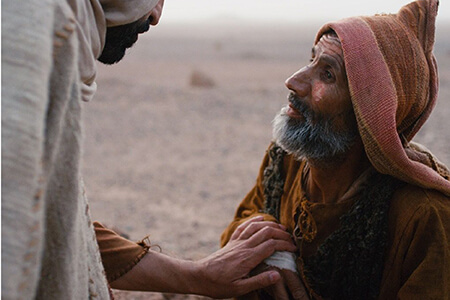 Leviticus 13:1-2, 44-46
Leviticus 13:1-2, 44-46
 1 Corinthians 10:31-11:1
1 Corinthians 10:31-11:1
 Mark 1:40-45
Mark 1:40-45
This week’s gospel reading is about Jesus’ cleansing of a leper. Out of love, He heals him, “Moved with pity, Jesus stretched out his hand and touched him”, “and he was made clean” (Mk 1: 41-42). During the Old Testament time, leprosy was a skin disease that deemed victims unclean and unfit to participate in the liturgical life of Israel; such uncleanness was considered contagious (Ignatius Bible Study P67). The First Reading is an account of our Lord speaking to Moses and Aaron that lepers should “live alone with their dwelling outside the camp" (Lev 13:46). In this episode, Jesus reaches across this divide between Himself and the leper when He touches the leper and cleanses him. While others would be defiled by such contact, Jesus conquers the uncleanness by the greater power of His holiness (IBS P67).
After the leper is made clean, Jesus sternly warns him to say nothing to anyone “but the man went out and proclaim it freely” (Mk 1:44). We may wonder why Jesus keeps his miraculous healings a secret. This is because Jesus’ ministry on earth is to preach the Kingdom of God, “For that is why I came”, to liberate people from the burdens of Satin, sickness and sin (Mk 1:38, IBS P 67). He exhorts the healed to remain silent in order to conceal His identity as the Messiah; He does not want His miracles to disconnect from His saving message. In Jesus’ time, people’s expectation of the Messiah was an outstanding royal and military figure who would liberate Israel from the oppressive rule of the Romans, subdue their enemies and re-establish the worldly kingdom of David in Jerusalem (ISB P 62, 67). Jesus wishes to downplay this expectation.
There are instances that Jesus does heal all those who are brought to him, “Jesus went about all Galilee, teaching in their synagogues, and preaching the gospel of the kingdom: and healing all manner of sickness and every infirmity, among the people” (Mt 4:23). Yet He does not heal all the sick in His time nor in the present day. Why is that? The Church recognizes that illness and suffering are among the gravest problems in human life; we would experience utter powerlessness and even a glimpse of death. Illness may lead to despair and even revolt against God or it can make us discern what is essential in life and follow accordingly. Very often, it provokes a search for God and return to Him (Ref CCC 1500-1). “[Jesus’] healings were signs of the coming of the Kingdom of God. They announced a more radical healing: the victory over sin and death through his Passover. On the cross Christ took upon himself the whole weight of evil and took away the ‘sin of the world,’ of which illness is only a consequence. By his passion and death on the cross Christ has given a new meaning to suffering: it can henceforth configure us to him and unite us with his redemptive Passion” (CCC 1505). Jesus invites his disciples to follow him by taking up their cross. By following him, we acquire a new look on illness and the sick (CCC 1506).
“I was sick and you visited me” Jesus said (Mt 25: 36). Next time, when we visit the sick, let us be reminded by St. Paul’s teaching in the second reading to imitate Christ, “Be imitators of me, as I am of Christ” (1 Corinthians 11:1). We must imitate Christ’s compassion and love towards the sick, be generous with our time and kindness, maybe we can even help the person find or rekindle the flame of faith. On the other hand, we could be inspired and our faith could be strengthened by witnessing the sick person’s courage and complete reliance on the Lord our God.
